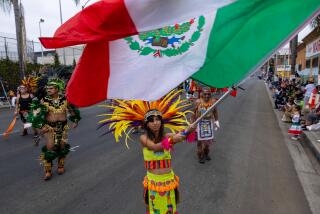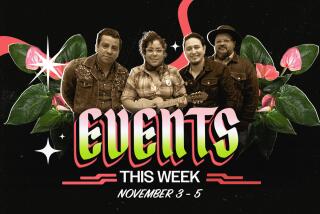Is a Day of Reckoning in Store for Columbus? : Milestones: Larger American Indian groups had intended to ignore the 500th anniversary of the explorer’s voyage. But now some plan ‘to claim our 15 minutes of fame.’
- Share via
In Los Angeles, American Indian spiritual leaders will gather on a sacred hilltop overlooking the Pacific Ocean for four days of prayers, rituals, and ceremonial songs and dances.
In San Francisco, Indian organizers plan a host of protests, including a tribunal sitting in judgment on the “genocide” of native tribes.
At the National Cathedral in Washington, Indians from North, Central and South America will gather for “a celebration of survival” consisting of an all-night prayer vigil and a dawn “cleansing ceremony,” followed by a procession of tribal representatives to the cadence of drums.
And in New York, Indians will demonstrate for representation in the United Nations.
Across the country, Indians and their supporters are gathering their strength for what they see as this Election Year’s most potent date: the 500th anniversary of Columbus’ first voyage to America, on Oct. 12. And although it remains to be seen how effective and visible these efforts will be, the moves represent an apparent shift among Indians--particularly in larger organizations--in favor of marking the anniversary.
“We haven’t had any defining moments like Wounded Knee and Alcatraz recently, and this represents a chance for us to claim our 15 minutes of fame,” says Michael Anderson, executive director of the Washington-based National Congress of American Indians, referring to two highly publicized confrontations in past years between Indians and federal authorities.
In a break with its previous hands-off stance, the National Congress--which represents about 25% of the Indian and native Alaskan population--will decide next month whether to stage an observance, Anderson says.
“I think it’s going to be a series of fairly small events,” he explains.
Yet as Anderson concedes, Indian organizations continue to be divided over how--or even whether--to participate in this mega-anniversary.
Over the past couple of years, opposition to the global observation of Columbus’ voyage seemed dominated by smaller, uncoordinated “fringe” groups, including protesters who unfailingly shadow the replicas of his ships as they dock in New World ports.
Organizers of official events, including the Spanish government, moved to deflect criticism by including Indians in some ceremonies and planning. In an exercise of political correctness, words such as commemoration and encounter often have been substituted for celebration and discovery .
Finally, many Indians had said they wouldn’t stoop to recognize the day in any fashion.
“What’s really interesting is that over the last two years I haven’t gotten one call from a Native American about Columbus,” says Paul Apodaca of Santa Ana, an Indian of Navajo and Mexican descent who keeps an eye on native concerns.
Thus, major groups such as the Native American Rights Fund decided to sit the day out, arguing that the quincentennial is a distraction from more pressing issues of threats to Indian religious rights and tribal sovereignty.
In other cases, Indians are split over the style and content of observances: Should they be “positive,” highlighting the achievements and values of Indian cultures? Should they be held in a spirit of forgiveness? Or should they be militant protests over historical horrors and current predicaments?
As a result, observances--and their media slant--will vary widely.
“There’s a lot of Indian anger over the whole history of American-European relations . . . but we need also to have a reconciliation over what’s happened,” says Rose Robinson, a Hopi Indian and an organizer of the ecumenical ceremony planned for the National Cathedral. When she began planning the event, Robinson says, “I was really surprised that people wanted to see some real positiveness out of this.”
Billy Red Wing Tayac, a Piscataway Indian from Maryland, has an entirely different attitude. Tayac is a leader of both the American Indian Movement and the League of Indigenous Sovereign Nations, which is organizing a demonstration at the United Nations for Columbus Day. The league, composed of Indians from throughout the Western Hemisphere, will demand a seat at the United Nations on behalf of Indians from all the Americas, Tayac says.
“We’re not interested in a walk, we’re not interested in a run, we’re not interested in a cultural event,” he explains. “We’re demanding a voice in mankind. We want to know why we’re excluded from mankind.”
Tayac is philosophical about the chances for gaining U.N. representation, however: “You never know until you try.”
Other events will focus on native religion and eschew the trappings of modern American civilization.
Cameras and sound equipment, as well as alcohol and drugs, will be banned from the Los Angeles gathering of Indian spiritual leaders, to be held at the Angels Gate Cultural Center in San Pedro. The site is sacred to the Chumash and Gabrielino tribes, says John Funmaker, executive director of the Iron Circle Nation, which is sponsoring the event. In keeping with the location, organizers say they are more concerned with giving traditional elders a chance to propagate their teachings than with media coverage.
A statement from the Iron Circle Nation maintains that the gathering “is spiritual in nature and not a political event” and is “intended to facilitate healing the wounds of the past and to create an atmosphere of harmony amongst all people.”
Indeed, the most political aspect of the encampment is what won’t happen. Participants will pull up stakes Oct. 11 because Columbus Day will be “a day of mourning,” Funmaker says.
But elsewhere, events seem designed for maximum media and political impact. For instance, Indians traveling on foot and in an automobile caravan are scheduled to converge on Leavenworth, Kan., over Memorial Day weekend to show support for Leonard Peltier, the American Indian Movement activist held in the federal prison there.
Services also will be held in Leavenworth as a “500-year memorial for all the warriors who lost their lives defending the Americas against European invasion,” says Bobby Castillo, an event organizer and Peltier spokesman. Peltier, whose case has become an international issue, is serving a life sentence in connection with the the 1975 murders of two FBI agents during a shootout on Pine Ridge Reservation in South Dakota.
Castillo, based in San Francisco, proselytizes from a center of major counter-Columbus ferment. Anti-Columbus groups with names such as Resistance 500 dot the Bay Area and, according to Castillo and others, the city could well resemble a demonstrators’ heaven come fall.
The city’s political subcultures already have feasted on a banquet of organizing and strategy meetings. One tactic that emerged early: Ask city councils to rename Oct. 12 Indigenous Peoples Day.
Malcolm Margolin, publisher of the newsletter News from Native California, recalls: “It got to the point that it seemed half your life was taken up with meetings about what to do for the quincentennial.”
Columbus Day protesters in San Francisco have been inadvertently assisted by official confusion at the national and local levels. Plans once called for the Bay Area to be a major center for the anniversary. But last month, the chairman of the San Francisco Bay Columbus Quincentenary Committee resigned not long after telling a local newspaper that the city’s efforts had been crippled by a lack of money and “disarray” at the federal commission in charge of coordinating the national celebration.
Consequently, festivities that once were planned, including a visit by the replicas of Columbus’ three ships to the city, are uncertain, according to reports. The quincentenary committee’s new leadership did not return calls from The Times.
At any rate, Indian activists vow they will not go away once the hoopla has died down. Several noted that the United Nations has designated 1993 as the Year of Indigenous Peoples, a time to call attention to groups whose identities defy national boundaries.
“We’re using ’92 as a springboard into ‘93,” says Yvonne Swan of the International Indian Treaty Council in San Francisco. “What we’d like to do is provide an alternative education to the celebration of Columbus. We want to show the indigenous point of view.”
More to Read
Sign up for Essential California
The most important California stories and recommendations in your inbox every morning.
You may occasionally receive promotional content from the Los Angeles Times.













